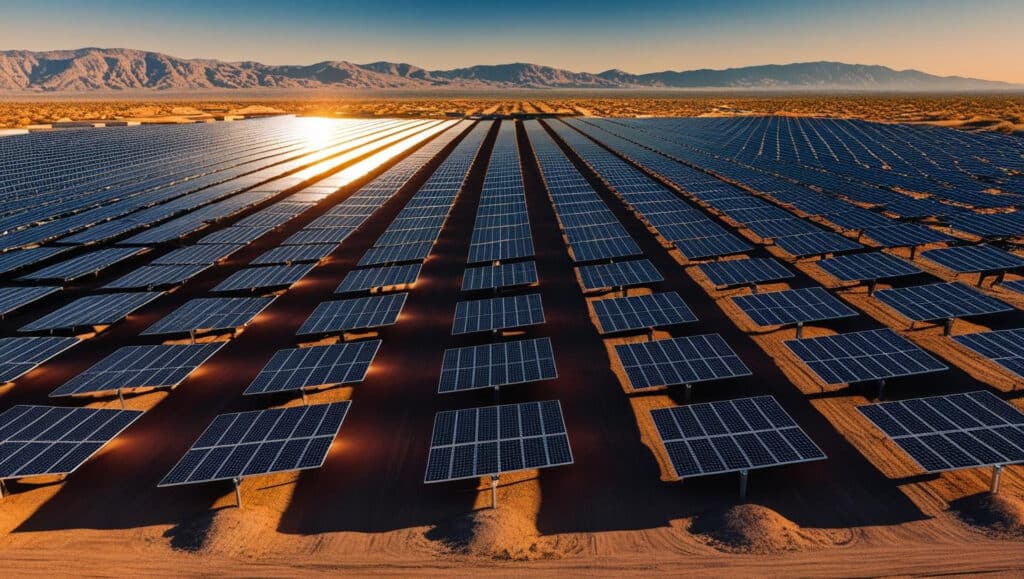Key Takeaways
- Federal tax credits like the ITC offer businesses up to 30% off solar installation costs, making the transition to solar energy financially appealing.
- Maximizing solar incentives requires strategic planning, including eligibility checks, documentation, and consulting tax professionals for optimum savings.
- Nevada’s additional state incentives, such as sales tax and property tax exemptions, complement federal credits, amplifying financial benefits for commercial solar projects.
Welcome to the ultimate guide on leveraging tax incentives for commercial solar in 2025! As the push towards renewable energy gains momentum, businesses are increasingly turning to solar energy systems to reduce energy costs and enhance sustainability.
In this blog, we will explore how federal and state tax credits can significantly lower solar installation costs, ensuring substantial financial benefits for your business. With expert insights from Sun Source Energy, a leading commercial solar installer, you’ll discover how to navigate the complexities of solar tax credits and maximize your savings.
Join us on this journey to a sustainable future, where solar power not only benefits the environment but also your bottom line.
Understanding Federal Tax Incentives for Commercial Solar

Federal solar tax credits are designed to significantly reduce the costs associated with installing solar energy systems. Businesses that transition to solar power can reap the rewards of reduced energy costs, enhanced financial benefits, and improved overall energy efficiency. A thorough understanding of these incentives helps businesses navigate the complex claiming process and maximize their savings.
The federal investment tax credit (ITC) enables businesses to deduct 30% of their costs for solar installations from federal taxes. This makes it one of the most appealing incentives currently offered. Other valuable incentives include the production tax credit (PTC) and the direct pay option for nonprofits. Together, these incentives significantly lower solar installation costs, making solar energy systems an appealing investment for businesses.
Federal Investment Tax Credit (ITC)
The Federal Investment Tax Credit (ITC) is a cornerstone of federal solar investment tax credit incentives, allowing businesses to deduct 30% of their solar installation costs from their federal taxes. This applies to both new and existing commercial properties, providing substantial financial benefits and encouraging businesses to invest in renewable energy. The ITC is available until 2025, after which it will decrease to 10% for commercial installations. Businesses such as PepsiCo and IKEA have successfully utilized the ITC to transition to clean energy, achieving significant savings on energy expenses.
The Inflation Reduction Act of 2022 further supports the ITC by providing additional tax credits to help companies transition more affordably to clean energy. These incentives not only reduce the initial investment required for solar installations but also enhance long-term financial savings by lowering operational costs and improving energy efficiency.
Production Tax Credit (PTC)
The Production Tax Credit (PTC) offers financial incentives based on the amount of electricity generated by solar energy systems. This credit provides additional benefits for projects meeting specific labor and domestic content standards, further encouraging the adoption of renewable energy.
The PTC enhances the attractiveness of solar investments by rewarding businesses for the electricity their systems produce.
Direct Pay Option for Nonprofits
Nonprofits can also benefit from solar incentives through the Direct Pay Option, which allows them to claim solar tax credits directly from the Treasury. This option ensures that tax-exempt organizations can access the same financial benefits available to businesses, making it easier for them to invest in solar energy systems.
Utilizing the Direct Pay Option helps nonprofits significantly reduce their energy costs and promote sustainability within their operations.
Key Steps to Maximize Federal Solar Tax Credits
Maximizing federal solar tax credits involves a strategic approach to ensure eligibility, calculate potential savings, and consult tax professionals. These steps are crucial for businesses to capitalize on the financial benefits of solar energy investments. Following these guidelines allows businesses to significantly lower solar installation costs and enhance overall energy efficiency.
Before installing solar panels, businesses should conduct a thorough site evaluation, secure necessary permits, and track important deadlines. Claiming federal tax credits requires detailed documentation and compliance with federal, state, and local regulations. Consulting a tax expert can further optimize savings by navigating the specifics of solar tax credits and ensuring all eligible incentives are claimed.
Determining Eligibility
To qualify for federal solar tax credits, the property must be owned by the taxpayer and serve as a primary residence or business location. Ensuring that all solar installations comply with federal, state, and local regulations is crucial for meeting eligibility requirements. Documentation such as proof of purchase, installation receipts, and the Manufacturer’s Certification Statement is required to claim federal tax credits.
Taxpayers must also have a tax liability equal to or greater than the amount of the credit they are claiming to benefit from the tax credits. The solar installation must be completed and operational by the end of the tax year to qualify for the federal solar tax credit.
For nonprofits, compliance with specific domestic production requirements is necessary to receive the full 30% tax credit. Meeting installation guidelines and regulations is crucial for qualifying for federal solar tax credits. Businesses should carefully review all requirements and deadlines to ensure they maximize their available credits.
Calculating Potential Savings
Calculating potential savings from federal solar tax credits involves understanding the percentage of solar installation costs that can be deducted from federal taxes. For example, businesses can claim 26% of the total cost of their solar panel system as a federal tax credit, significantly reducing their tax liability. For a solar panel system costing $20,000, the potential tax credit would be $5,200.
Factors influencing tax credit savings include the cost of the system and the taxpayer’s tax liability. Higher system costs lead to more potential savings from tax credits. Specific tax situations and installation sizes also affect the savings achieved through tax credits.
Businesses should research available credits, plan their budgets, and track key deadlines to maximize potential savings. Achieving maximum savings from federal tax credits can significantly reduce the initial investment required for solar energy projects. Carefully calculating potential savings and ensuring compliance with eligibility criteria enhances overall financial benefits and energy efficiency.
Consulting Tax Professionals
Engaging with a tax expert can help businesses navigate the specifics of solar tax credits and maximize their savings. Tax professionals can provide valuable guidance on eligibility requirements, documentation, and strategies to optimize tax benefits.
Consulting with experts ensures businesses take full advantage of available tax incentives and minimize their tax liability.
State-Level Incentives for Commercial Solar in Nevada

In addition to federal tax credits, Nevada offers various state-level incentives that can further reduce the costs associated with commercial solar installations. These incentives include sales tax exemptions, property tax abatements, and net metering programs, which complement federal tax credits and enhance overall savings.
Leveraging both federal and state incentives allows businesses in Nevada to maximize their energy savings and financial benefits.
Sales Tax Exemption
Nevada provides a sales tax exemption for solar equipment purchases, significantly lowering the initial expenses of solar projects. This exemption effectively reduces the overall installation cost, making solar investments more attractive and affordable for businesses.
Taking advantage of this sales tax exemption further enhances financial savings and reduces solar installation costs.
Property Tax Exemption
Commercial solar installations in Nevada can benefit from property tax abatements, ensuring that property tax liability does not increase despite the enhanced value of the property. Businesses can apply for a property tax abatement of up to 55% for solar generation facilities for a duration of 20 years, providing substantial financial relief.
This exemption allows businesses to invest in solar energy systems without worrying about higher property taxes.
Net Metering Programs
Net metering programs in Nevada enable businesses to sell excess solar power back to the grid for energy credits. Participating in these programs allows businesses to offset energy costs and earn credits for surplus power generated by their solar systems.
This not only enhances energy savings but also contributes to a more sustainable energy strategy.
Leveraging Financial Incentives for Maximum Savings
Combining various financial incentives can significantly enhance the overall savings for businesses investing in solar energy. Federal solar tax credits, state-level rebates, and local utility incentives can be effectively paired to reduce both initial and ongoing costs of solar projects. Leveraging these incentives helps businesses achieve substantial financial benefits and improve energy efficiency.
Retail chains and other businesses have successfully integrated solar installations with the help of federal and state tax incentives, achieving notable energy savings and reduced operational costs. Partnering with experts like Sun Source Energy can further enhance a business’s tax benefits from solar energy, ensuring they maximize their available incentives.
Combining Federal and State Incentives
Combining federal and state financial incentives can significantly lower both initial and ongoing costs for solar projects. Utilizing these incentives together reduces the overall investment cost for solar systems and enhances financial benefits. This approach allows businesses to maximize their savings and improve their energy efficiency.
Businesses should carefully research and plan to take full advantage of all available incentives, ensuring they meet eligibility criteria and track important deadlines. Combining different financial incentives can significantly enhance the return on investment for solar projects, making them more viable and attractive.
Utilizing Accelerated Depreciation
Accelerated depreciation, through the Modified Accelerated Cost Recovery System (MACRS), offers businesses the ability to recover the costs of solar equipment over a shorter period, specifically five years. This method provides a substantial tax benefit by allowing businesses to depreciate their solar investment more quickly, thus reducing their taxable income and enhancing cash flow.
Leveraging accelerated depreciation methods significantly improves the return on investment for solar energy projects. In addition, incentives like bonus depreciation can further reduce the initial costs associated with solar installations, making it easier for businesses to manage the financial aspects of their solar investments.
Exploring Power Purchase Agreements (PPAs)
Power Purchase Agreements (PPAs) are an innovative financial strategy that allows businesses to install solar systems without any upfront costs. Through a PPA, a third-party developer installs, owns, and operates the solar panels, and the business agrees to purchase the power generated at a fixed rate, often lower than current electricity costs. This arrangement can lead to significant savings on energy bills and provide businesses with stable, predictable energy costs over time.
PPAs are especially beneficial for businesses looking to avoid the initial investment typically required for solar installations. Entering into a PPA allows businesses to enjoy the benefits of solar energy, such as reduced energy costs and improved sustainability, without the financial burden of purchasing and maintaining the solar equipment.
Case Studies: Successful Commercial Solar Projects

Real-world examples of successful commercial solar projects highlight the tangible benefits of leveraging federal and state incentives. These case studies showcase how businesses have effectively utilized solar tax credits and other incentives to reduce their energy costs and improve their sustainability through renewable energy projects.
Retail Chain Solar Installation
H&M, a well-known retail chain, utilized a commercial solar system that covered most of its rooftop, significantly reducing energy costs. Maximizing the usage of available rooftop space allowed H&M to achieve substantial energy savings and enhance its sustainability efforts.
Manufacturing Plant Solar Project
A manufacturing company utilized the federal investment tax credit to achieve a payback period of just 3.5 years for their solar panel installation. Combining federal tax credits with local incentives enhanced the company’s energy efficiency and significantly reduced operational expenses.
Overcoming Common Roadblocks
Implementing solar energy systems can come with challenges, but with the right strategies, businesses can overcome these roadblocks. Engaging with Sun Source Energy can help businesses navigate the complexities of solar system installation and optimize available tax incentives.
Navigating Complex Regulations
Compliance with federal, state, and local regulations is essential for securing tax credits for solar installations. Understanding specific requirements, such as project size or labor stipulations, is crucial to ensure eligibility for available incentives.
Partnering with experts like Sun Source Energy can simplify this process and ensure businesses meet all necessary criteria.
Managing Initial Investment Costs
High upfront costs can be a significant barrier to solar investments, but businesses can mitigate this through various financing options, such as leasing. Additionally, bonus depreciation benefits can offset the cost of solar installation, enabling businesses to maximize savings through tax incentives.
Ensuring Long-Term Maintenance
Regular monitoring and maintenance of solar systems are crucial for ensuring optimal energy production over time. Implementing effective monitoring practices helps maintain peak efficiency, prolongs the lifespan of solar systems, and ensures continued financial benefits.
Why Choose Sun Source Energy
Sun Source Energy offers expert guidance and high-quality solar installations, ensuring businesses can maximize their tax incentives and achieve substantial energy savings. Partnering with Sun Source Energy can help businesses navigate the complexities of solar projects and optimize their financial benefits.
Sun Source uses top-rated hardware and American-made solar panels for installations, ensuring reliability and performance. Customer satisfaction is a top priority, with transparent communication and support throughout the installation process.
Headquartered in Las Vegas, Nevada, Sun Source Energy is accessible for local businesses seeking solar solutions.
Contact Information
For expert guidance on initiating commercial solar projects, businesses can contact Sun Source Energy via phone at 800-674-9750 or by filling out our contact form here.
Choosing Sun Source Energy ensures reliable installation and maximization of tax incentives for solar investments.
Summary
Leveraging federal and state tax incentives for commercial solar installations can significantly reduce costs and enhance energy savings. By understanding and utilizing incentives like the federal investment tax credit, production tax credit, and state-level programs in Nevada, businesses can achieve substantial financial benefits and improve their sustainability. Real-world case studies demonstrate the successful implementation of solar projects, highlighting the tangible benefits of these incentives.
As businesses navigate the journey towards solar energy, partnering with experts like Sun Source Energy can provide valuable guidance and support. By overcoming common roadblocks, such as complex regulations and high initial costs, businesses can maximize their savings and contribute to a sustainable future.
Take the first step towards harnessing the power of solar energy and enjoy the financial and environmental benefits it offers.
Frequently Asked Questions
What is the Federal Investment Tax Credit (ITC)?
The Federal Investment Tax Credit (ITC) enables businesses to reduce their federal tax liability by 30% of their solar installation costs, making it a fantastic opportunity to invest in renewable energy. Embracing this credit can significantly lower your upfront expenses and enhance your energy savings!
How do state-level incentives in Nevada complement federal tax credits?
State-level incentives in Nevada, such as sales tax exemptions and property tax abatements, significantly enhance the value of federal tax credits by reducing the overall costs of solar installations. This combination makes investing in solar energy in Nevada even more appealing and financially beneficial!
What is the Direct Pay Option for nonprofits?
The Direct Pay Option for nonprofits allows organizations to directly receive solar tax credits from the Treasury, giving them access to valuable incentives similar to those available to businesses. This means nonprofits can enhance their financial sustainability while promoting clean energy!
How can businesses maximize their savings from solar tax credits?
To maximize savings from solar tax credits, businesses should determine their eligibility, calculate potential savings, and consult with tax professionals for the best strategies. Taking these steps can significantly enhance your financial benefits!
Why should businesses choose Sun Source Energy for their solar projects?
Choosing Sun Source Energy for your solar projects is a smart move, as they provide expert guidance and top-quality American-made panels, helping you to maximize your tax incentives effectively. You’ll be making a bright choice for sustainable energy!






